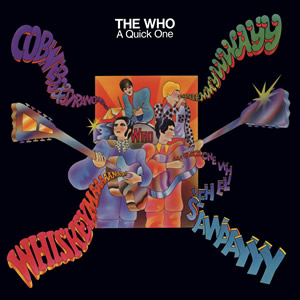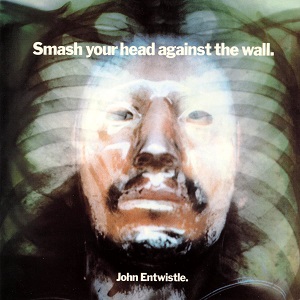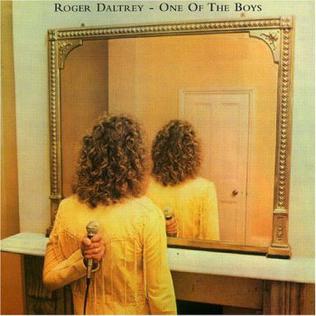
John Alec Entwistle was an English musician who was the bassist for the rock band the Who. Entwistle's music career spanned over four decades. Nicknamed "The Ox" and "Thunderfingers", he was the band's only member with formal musical training and also provided backing and occasional lead vocals. Entwistle was inducted into the Rock and Roll Hall of Fame as a member of the Who in 1990.

Roger Harry Daltrey is an English singer, musician and actor. He is co-founder and lead singer of rock band the Who.

Who's Next is the fifth studio album by the English rock band the Who, released on 2 August 1971. It developed from the aborted Lifehouse project, a multi-media rock opera conceived by the group's guitarist Pete Townshend as a follow-up to the band's 1969 album Tommy. The project was cancelled owing to its complexity and to conflicts with Kit Lambert, the band's manager, but the group salvaged some of the songs, without the connecting story elements, to release as their next album. Eight of the nine songs on Who's Next were from Lifehouse, with the lone exception being the John Entwistle-penned "My Wife". Ultimately, the remaining Lifehouse tracks would all be released on other albums throughout the next decade.

A Quick One is the second studio album by the English rock band the Who, released on 9 December 1966. A version of the album with an altered track listing was released under the name Happy Jack on Decca Records in April 1967 in the United States, where the song "Happy Jack" was a top 40 hit.

Murray Seafield St George Head is an English actor and singer. Head has appeared in a number of films, including a starring role as the character Bob Elkin in the BAFTA award winning and Oscar-nominated 1971 film Sunday Bloody Sunday. As a musician, he is most recognised for his international hit songs "Superstar" and "One Night in Bangkok". He has been involved in several projects since the 1960s and continues to record music, perform concerts, and make appearances on television either as himself or as a character actor.

Face Dances is the ninth studio album by English rock band the Who. It was released in 1981 by Warner Bros. in the United States and on Polydor in the United Kingdom. It is one of two Who studio albums with drummer Kenney Jones, who joined the band after Keith Moon's death three years earlier.

Meaty Beaty Big and Bouncy is a compilation album of singles by English rock band the Who, released in 1971 as Track 2406 006 in the UK and as Decca DL 79184 in the US. It entered the US Billboard 200 chart on 20 November 1971, peaking at number 11, and the UK chart on 3 December 1971, peaking at number 9.

Odds & Sods is an album of studio outtakes by British rock band the Who. It was released by Track Records in the UK and Track/MCA in the US in October 1974. Ten of the recordings on the original eleven-song album were previously unreleased. The album reached No. 10 on the UK charts and No. 15 in the US.
"My Wife" is a song by the British rock band the Who, written and sung by bass guitarist John Entwistle. It was originally released in 1971 on Who's Next and later as the B-side of the single "Baba O'Riley" on 6 November 1971 in Europe by Polydor Records.

"5:15" is a song written by Pete Townshend of British rock band The Who. Part of the band's second rock opera, Quadrophenia (1973), the song was also released as a single and reached No. 20 on the UK Singles Chart, while the 1979 re-release reached No. 45 on the Billboard Hot 100.

Smash Your Head Against the Wall is the debut solo studio album by English rock musician John Entwistle, released in May 1971 by Track Records in the UK and Decca Records in the US. Smash Your Head Against the Wall was the first solo album by any member of rock band the Who, born out of Entwistle's frustrations within the band, namely not having as many of his songs featured on their albums as he would've liked, and it features a guest appearance by the Who's drummer Keith Moon on one track, as well as strong musical influences from the band's work.

"Who Are You" is the title track on the Who's 1978 album, Who Are You, the last album released by the group before Keith Moon's death in September 1978. It was written by Pete Townshend and released as a double-A-sided single with the John Entwistle composition "Had Enough", also featured on the album. The song was one of the band's biggest hits in North America, peaking at number 7 in Canada and at number 14 in the United States, and has become one of the band's signature tunes at their live shows. The piano on the track is played by Rod Argent.

"We're Not Gonna Take It" is the final track on the Who's rock opera Tommy. Written by Pete Townshend, the song also contains the "See Me, Feel Me" anthem that is central to the structure of Tommy.

The Kids Are Alright is a soundtrack album by the British rock band The Who, a companion to the band's documentary film of the same name. As a compilation album, it serves as a retrospective look at the band's biggest hits throughout their career to the point it was released. Most of the tracks are live recordings, rather than the original studio versions.

One of the Boys is the third solo studio album by the Who's lead vocalist, Roger Daltrey. It was released in 1977, on Polydor in the UK, and MCA in the US. The sessions were recorded at the Who's Ramport Studios during the winter of 1976, and Daltrey allowed students from the local Battersea technical school to film them as an educational project. This also marked the first time that Daltrey had written or co-written a song since "Here for More" in 1970, and Lisztomania in 1975. Daltrey's original choice for producers were Jerry Leiber and Mike Stoller, but they declined.

The Kids Are Alright is a 1979 rockumentary film about the English rock band the Who, including live performances, promotional films and interviews from 1964 to 1978. It notably features the band's last performance with long-term drummer Keith Moon, filmed at Shepperton Studios in May 1978, three months before his death.

Who's Missing is a compilation of rare and previously unreleased songs by the English rock band the Who. Its second part, Two's Missing, was released on 11 April 1987.

Amazing Journey: The Story of The Who is a 2007 documentary by Murray Lerner and Paul Crowder about English rock and roll band The Who. The film features new interviews with band members Roger Daltrey, John Entwistle, Kenney Jones, and Pete Townshend, as well as Sting, The Edge, Noel Gallagher, Eddie Vedder, Steve Jones and others, as well as rare photos of the four members of the band, and archival live footage of performances dating back to 1964. A soundtrack accompanying the film also serves as a greatest-hits compilation for the band.

"Join Together" is a song by British rock band the Who, first released as a non-album single in June 1972. The song has since been performed live multiple times and has appeared on numerous compilation albums.

Five Three One - Double Seven O Four is the 19th UK studio album by the English rock/pop group the Hollies. When rendered as digits, the album title is the band's name upside down in digital number view. The idea is credited to guitarist Terry Sylvester.


















